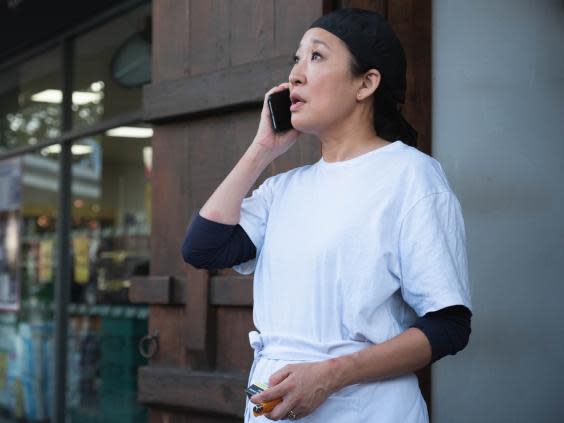Better off dead: Can someone please put Killing Eve out of its misery?

It is a tedious habit of mine that when I come across a brilliant new book or TV show, I will not only entreat friends, family and strangers on the internet to read or watch them, but I will go back and keep hassling until they cave in and do my bidding. When, two years ago, I saw Killing Eve, I begged people to watch and report back to me with their critical assessment – which, to be honest, was only welcome if it agreed with mine. This could be why my friends no longer answer my texts.
How I adored Killing Eve’s anarchic, blood-spattered game of cat and mouse, written by the brilliant Phoebe Waller-Bridge and starring Jodie Comer and Sandra Oh as, respectively, a Russian assassin and an MI6 agent. The first series hopscotched across Europe and chronicled the pair’s growing obsession with one another – Eve (Oh), bored with her desk job and school teacher husband, and Villanelle (Comer), waiting listlessly in a Paris apartment for instructions for her next hit.
Adapted from Luke Jennings’s Codename Villanelle novellas, Waller-Bridge’s script was a masterclass in understatement and pacing, and placed women at the heart of the piece, not in relation to men but on their own terms. Wilfully messing with our expectations, Killing Eve dismantled and reassembled the spy thriller, blending emotional gut-punches with clever sight gags, aesthetic elegance with unconscionable gore.
In an ideal world, this smart and funny show would have taken its final bow at the end of the first series, and left us gasping for more, but that is not television’s style. When a hit show comes along, the instinct is to keep it going and wring it dry – see The Handmaid’s Tale which went dispiritingly downhill after an electrifying first series; The Crown which returned with a dour and creaking third effort; and True Detective, the second series of which saw Colin Farrell out-performed by his own moustache.
And so it has proved with Killing Eve, the quality of which has plummeted so fast it’s a wonder the cast don’t have whiplash. It’s significant that the second season was written not by Waller-Bridge but by Emerald Fennell, an actor known for roles in The Crown and Vita and Virginia, and lumbered here with the impossible task of following a stone-cold writing genius. With its fancy locations and fancier outfits, the series looked good enough to eat, but the writing lost the wit and sparkle of its predecessor.
This weekend brings a third series courtesy of another writer, Suzanne Heathcote, who worked on the American series Fear the Walking Dead. The action picks up a few months after our protagonists’ last meeting in Rome where they dispatched a psychopathic tech baron, and in which Villanelle later shot Eve and left her for dead. Now we find Villanelle at a wedding reception – her own, as it turns out – which is gate-crashed by a figure from her past, a Russian gymnast-turned-handler, Dasha, played by a scenery-chewing Harriet Walter. Dasha is keen to get her back to work and so, when Villanelle requests a promotion, she sets her up with an apprentice. Meanwhile, Eve is alive and lying low in New Malden, forlornly churning out dumplings in a restaurant kitchen.

Like the second series, it isn’t unwatchable, it’s just exasperatingly average. In a new and unknown thriller, this wouldn’t be a heinous crime, but “average” puts it a universe away from the sprightly and brilliantly inventive first season, and leaves the viewer hankering for what might have been. Without Waller-Bridge’s guiding pen, implausibilities abound and gags gasp for air. Eve and Villanelle’s formerly thrilling cross-continental flirtation now feels like a habit, with each of them taking on the spectre of an irksome friend who won’t stop wanging on about their ex. And while I will never tire of seeing Comer snapping bones in high-end couture, there’s nothing here to equal the exquisite poisoned perfume scene in the first series. You can practically smell the effort that has gone into keeping the plot moving forward. Try as she might, Heathcote fails to make a case for the show’s continued existence.
In the grand scheme of things, this might not seem a big deal. Rare is the critically feted series that can maintain the qualities that gripped audiences at the start. And, in the age of “peak TV”, there are scores of other shows ripe for bingeing and about which you can be sure I’ll be spamming my friends. But artistic judgement isn’t simply about good casting and clever writing – it’s about preserving a work’s legacy and knowing when to quit. Phoebe Waller-Bridge rightly called time on Fleabag after two seasons, allowing it to be remembered as a fully fledged masterpiece rather than a once-great show that outstayed its welcome.
The blurb under the trailer for the new Killing Eve reads “contains some upsetting scenes”, which is true though not for the reasons its creators think. The series has already been pegged for a fourth season, though the kindest thing to do would be to kill Eve – and the show – off entirely.
Killing Eve season three begins on BBC iPlayer on 13 April

 Yahoo News
Yahoo News 